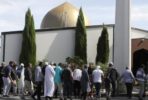Muslim religious elites have repeatedly been told to categorically condemn the Sunni militant group Islamic State, with Pope Francis being the latest to make such a call. During a three-day visit to Turkey, he told Prime Minister Recep Erdogan that Muslim politicians, ulama (religious scholars) and academics should repudiate violence. He expressed his concern after an escalation of attacks on minority Christians living in Iraq.
The Pope’s concern is valid. However, it raises several questions. First, has Muslims’ condemnation of the Islamic State so far been insufficient? Sheikh Ahmad Tayyeb, the rector of Al-Azhar University, a world-renowned institute for Islamic studies, has openly condemned the militant group. He was joined by the Egyptian grand mufti, Shawqi Allam, and Al-Azhar graduate students who also expressed their disapproval towards the terrorist group. King Abdullah Hussein of Jordan has even compared fighting the Islamic State to battling in World War III.
Similarly, Australian Muslim ulama’s condemnation of the recent Sydney Lindt Chocolate Cafe hostage crisis was immediate, while the event was unfolding. The hostage-taker, Man Haron Monis, had forced two hostages to press a black flag — similar to the Islamic State’s — against the cafe’s window. This shows that for many ulama, any form of association with the militant group is deplorable.
Second, will repeated condemnation of Islamic State militants change the situation for the better? On the one hand, Muslim ulama’s condemnation has so far fallen on the militants’ deaf ears. On the other hand, they are “deafening” to Muslims who have repeatedly opposed the group.
How many times do Muslims have to say the Islamic State does not represent Islam, the Quran and Islamic traditions before they are believed? Moreover, condemning the group alone does not generate a better understanding of its emergence if the social, political and economic conditions that gave rise to its struggle are neglected. As Sheikh Ahmad Tayyed correctly points out: “The emergence of the Islamic State is a natural result of political marginalisation in Iraq.”
Asking Muslims to keep condemning the group also neglects the many commendable efforts to tackle extremism on the ground, including in South-east Asia.
The region’s Muslim leaders who attended the recent MABIMS meeting — an annual meeting of Islamic religious ministers from Indonesia, Malaysia, Singapore and Brunei —criticised the Islamic State’s use of the faith to recruit Muslims to its cause.
To be sure, South-east Asia has been a hotbed of terrorist activity as much as the Middle East. Some South-east Asian Muslim youth have also joined the group’s struggle, thinking it is a form of “jihad” or holy war. At least 40 Malaysians have been linked to the Islamic State struggle and, most recently, the government suspected some of the country’s military men to be sympathetic to the group. Malaysian Prime Minister Najib Razak recently tabled a White Paper in Parliament recommending a new terrorism law to be passed to tackle the Islamic State issue.
The Singapore Muslim community has also stepped up efforts to prevent Muslims from being enticed into the group. The Religious Rehabilitation Group (RRG), which counselled Jemaah Islamiyah terrorists, has reminded Singaporean Muslims not to sympathise with the group’s struggle. Recently, it distributed leaflets entitled The Fallacies Of ISIS Islamic Caliphate as part of its ongoing efforts to develop better understanding of Islam.
The RRG also indicated the militant group has misrepresented Islam, indicating the group’s struggle to establish an Islamic state is misleading and serves only as an excuse to attract others to its cause. The RRG will receive S$250,000 over the next five years from the Islamic Religious Council of Singapore to support its de-radicalisation of terrorists.
MODERATES IN A MODERN WORLD
Nevertheless, having Muslims condemning the militant group alone does not make them moderate. It is easy to find some using Quranic verses or Prophetic traditions to denounce the group, but it is difficult to alter how they approach religious texts in other aspects, especially when they continue to harbour distrust towards the modern world.
This group seeks to replace the existing world order with what they perceive to be an Islamic one. The call for alternative Islamic order can manifest in violent and non-violent means. Today, we hear some Muslims pushing Islamic development, Islamic currency, Islamic cars and Islamic environmentalism, and the more extreme ones calling for an Islamic state and Islamic Caliphate.
Moderate Islam is not linked to only condemnation of the Islamic State. I see a moderate as one who seeks to live universal Islamic values in line with modern-day realities. One cannot be a moderate if one is calling for institutions that are not in sync with contemporary realities.
For example, the call for an Islamic Caliphate does not resonate in a world where empires have collapsed. Muslims now live in post-Westphalian states, which do not differentiate citizens based on religion, ethnicity or culture, making the Islamic state versus non-Islamic state dichotomy irrelevant. All citizens are equal in the eyes of the law and cannot live under a separate, exclusive system.
The challenge for Muslims now is to live in contemporary, multicultural societies as good, law-abiding citizens, who remain committed to Islamic values of justice, equality, freedom of expression and the right to privacy.
ABOUT THE AUTHOR:
Norshahril Saat is a PhD candidate at the Department of Political and Social Change, Australian National University. He researches on Indonesian and Malaysian politics.
Source: www.todayonline.com







